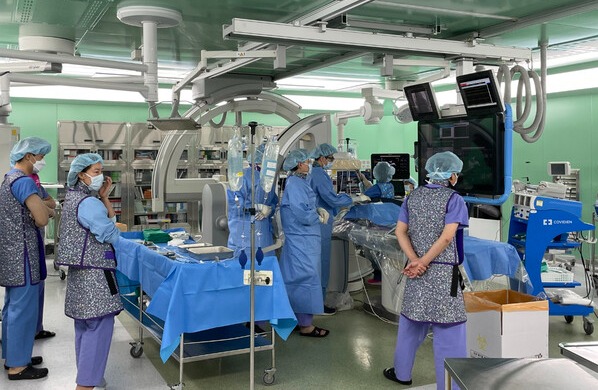
Interventional cardiologists are becoming increasingly hard to find in clinical sites due to aggravating work environments and frequent litigations.
Hospitals are experiencing difficulty performing myocardial infarction recanalization procedures, as the number of new entrants declined amid burnout of existing specialists and frequent lawsuits, the Korean Society of Interventional Cardiology (KSIC) said Saturday.
In a news conference at BEXCO, Busan, held before its annual conference, KSIC said the shortage of interventional cardiologists began to occur throughout the country this year.
The number of cardiologists and specialists in related sub-departments continued to decline from 62 in 2012 to 42 in 2022. Of these, only 28 are interventional cardiologists who perform high-risk procedures and must stand by for night duty and emergencies.
With the retirement of the first-generation interventional cardiologists born between 1956 and 1960, at least one in every tertiary general hospital is leaving the field, but they cannot fill the vacancy, the society said.
For instance, after an interventional cardiologist resigned from a hospital in Gangneung, the only emergency hospital in eastern Gangwon Province, patients with myocardial infarction in the region have had to be transferred to the province’s western region since March this year.
In Seoul, too, emergency patients in the northern districts of Nowon and Sanggye are being transferred to central Jongno or Seongbuk districts or even to Uijeongbu, north of Seoul, as hospitals for emergency myocardial infarction procedures in their districts are closed due to a lack of medical professionals.
"The number of interventional cardiologists is declining due to excessively long work hours, burnout, frequent litigation, and a sense of disenfranchisement from relatively low pay,” the society said. “If this continues, there will be an extreme shortage of new compared to retiring physicians, leading to higher mortality rates, especially in rural areas, due to gaps in emergency procedures for myocardial infarction."
It pointed out that although the government is pushing to expand the medical school enrollment quota to increase the workforce in essential care areas, it is unlikely to be effective unless frequent lawsuits and poor working conditions are improved.
"Without a solution to current overwork, low pay, and high litigation, we will continue to see the failure of healthcare policies. For instance, the government doubled the number of licensed nurses over the past decade, but working nurses increased less than 20 percent,” the society said.
It went on to say, "The government should urgently consider increasing reimbursement for cardiovascular interventional procedures, providing at least 24 hours of rest for nurses who are on call, and providing insurance coverage that pays for being on call.”

